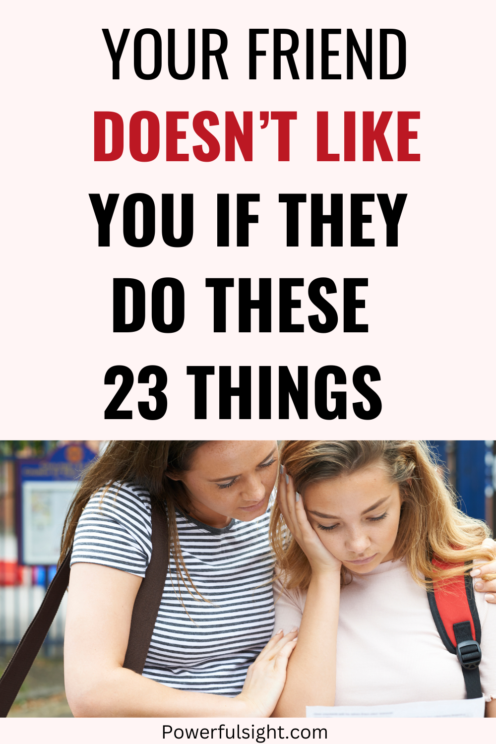Friendship is a cornerstone of our lives, providing emotional support, companionship, and a sense of belonging.
However, not all friendships are created equal, and it’s crucial to recognize the signs that your friends may not genuinely care about you.
Here are warning signs that your friends might not actually like you.
Signs Your Friends Dont Like You
1. Lack of Communication
One of the most telling signs that your friends may not genuinely like you is a lack of meaningful communication.
If you find that your interactions are limited to brief, superficial exchanges or that your friends rarely initiate contact, it could be a sign that they don’t value your friendship as much as you do.
Genuine friends make an effort to stay connected, share their thoughts and feelings, and engage in deeper conversations.
2. Being Left Out or Not Invited to Social Gatherings
If you notice that your friends regularly exclude you from social activities, such as group outings, parties, or even casual get-togethers, it may be a sign that they don’t consider you a close friend.
Genuine friends make an effort to include you in their plans and make you feel like a valued member of the group.
3. They are not there for you during difficult times
True friends are there for you in good times and bad. If you find that your friends are not supportive or empathetic when you’re going through a difficult time, it could be a sign that they don’t truly care about your well-being.
Genuine friends will offer emotional support, lend a listening ear, and make an effort to help you through challenging situations.
4. One-Sided Relationships Where You Are the One Always Initiating Contact
In a healthy friendship, both parties should make an effort to maintain the relationship.
If you find that you’re always the one reaching out, initiating plans, or making an effort to keep the friendship alive, it could be a sign that your friends don’t value the relationship as much as you do.
Genuine friends will reciprocate your efforts and make an equal investment in the friendship.
Related: Signs of a one-sided friendship
5. They Frequently Put You Down or Belittle Your Achievements
Genuine friends should uplift and support one another, not constantly criticize or belittle your accomplishments. If your friends frequently make negative comments about you, your abilities, or your achievements, it could be a sign that they don’t truly value you as a friend.
6. They Ignore Your Opinions or Dismiss Your Feelings
In a healthy friendship, both parties should feel heard and respected. If your friends consistently ignore your opinions, dismiss your feelings, or make you feel like your thoughts and emotions don’t matter, it could be a sign that they don’t value your perspective or your role in the friendship.
7. They Don’t Confide in You or Keep Your Secrets
Trusting friendships are built on mutual vulnerability and openness. If your friends don’t confide in you or keep important secrets from you, it could be a sign that they don’t feel comfortable being fully authentic with you. Genuine friends share their thoughts, feelings, and experiences with one another, fostering a deeper sense of connection and trust.
8. Always Being the One to Give Without Receiving in Return
Healthy friendships are based on a balance of give and take. If you find that you’re always the one providing emotional support, financial assistance, or other resources to your friends without receiving the same level of support in return, it could be a sign that they are taking advantage of you or don’t value your friendship as much as you do.
Related: Signs someone doesn’t like you
9. They Feel Envious or Trying to One-Up You
Genuine friends should be happy with one another’s successes and achievements. If you notice that your friends seem jealous of your accomplishments or constantly try to one-up you, it could be a sign that they don’t truly support your growth and development as an individual.

10. Fake Compliments or Insincere Gestures
Authentic friendships are built on genuine appreciation and respect. If your friends’ compliments or gestures of kindness feel insincere or come with a hidden agenda, it could be a sign that they don’t truly value you as a friend.
Related: Signs of a fake friendship
11. Canceling Plans or Making Excuses
Reliable and committed friends will make an effort to follow through on plans and commitments. If your friends frequently cancel plans or make excuses for not showing up, it could be a sign that they don’t prioritize your time or the friendship.
12. Gossiping or Spreading Rumors
Genuine friends should be loyal and supportive, not engage in harmful gossip or spread negative information about you. If you discover that your friends are talking behind your back or spreading rumors, it could be a sign that they don’t truly value your friendship.
13. Lack of Interest in Your Life
Caring friends will take an active interest in your life, celebrating your successes and supporting you through challenges. If your friends seem disinterested in your achievements, personal milestones, or the details of your life, it could be a sign that they don’t truly value your friendship.
14. They Constantly Compare You to Others or Highlight Your Flaws
Genuine friends should uplift and support one another, not engage in constant comparison or highlight each other’s flaws. If your friends frequently compare you to others or point out your shortcomings, it could be a sign that they don’t truly value you as an individual.
15. Feeling Left Out in Group Settings
In a healthy friendship group, everyone should feel included and valued. If you consistently feel left out of conversations, activities, or decision-making processes, it could be a sign that your friends don’t consider you an integral part of the group.
16. Lack of Empathy
True friends should be empathetic and understanding, offering emotional support and compassion during difficult times. If your friends seem indifferent or unsupportive when you’re going through a challenging situation, it could be a sign that they don’t truly care about your well-being.
17. Lack of Loyalty
Loyal friends will stand up for you and have your back, even in the face of adversity. If your friends fail to defend you or betray your trust, it could be a sign that they don’t truly value your friendship.
18. Ignoring Boundaries
Healthy friendships are built on mutual respect and understanding of each other’s boundaries. If your friends consistently cross your boundaries or fail to respect your limits, it could be a sign that they don’t truly value you or your needs as a friend.
19. Changes in Behavior
Sudden changes in a friend’s behavior, such as becoming distant, cold, or different in their interactions with you, could be a sign that they no longer value your friendship as much as they once did.
20. Lack of Reciprocity
In a healthy friendship, both parties should make an equal effort to maintain the relationship. If you find that your friends don’t reciprocate your gestures of friendship, such as initiating plans, offering support, or expressing appreciation, it could be a sign that they don’t value the friendship as much as you do.
21. Feeling Unimportant or Undervalued
Genuine friends should make you feel important, valued, and appreciated. If you consistently feel like your friends don’t prioritize your needs or make you feel like an afterthought, it could be a sign that they don’t truly value your friendship.
22. Trust Your Intuition if Something Feels Off in the Friendship
Sometimes, the most telling sign that your friends don’t actually like you is a simple gut feeling. If you can’t shake the sense that something is off in your friendships, it’s important to trust your intuition and investigate further.
Steps to Take if You Suspect Your Friends Don’t Like You
If you’ve recognized several of these warning signs in your friendships, it’s important to take a step back and assess the situation objectively.
Consider the overall pattern of behavior, the frequency and severity of the concerning signs, and the overall impact on your well-being. It’s also crucial to reflect on your own role in the friendship and whether you’ve contributed to the dynamic in any way.
Once you’ve taken the time to evaluate the situation, it’s important to have an open and honest conversation with your friends.
Approach the conversation with empathy and a willingness to listen, and express your concerns in a non-confrontational manner. Be prepared to hear their perspectives and be open to finding a resolution that works for both parties.
If, after the conversation, you still feel that your friends don’t genuinely like you or value the friendship, it may be time to consider distancing yourself from those relationships.
Prioritize your own well-being and surround yourself with people who truly appreciate and support you.
Conclusion
Most friends are wolves in sheep’s clothing. If you find that your friends are not serving you in a positive and meaningful way, don’t hesitate to reevaluate those relationships and make the necessary changes to prioritize your own growth and fulfillment.
Save the pin for later

- How to Find a Good Divorce Lawyer for Consultation - 14/06/2025
- 10 Best Personal Development Courses Online - 16/05/2025
- 157 Charming Vintage Baby Names (With Meanings) - 12/05/2025